Friday, 20 February 2009
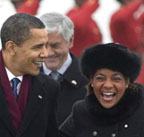 OTTAWA, FEBRUARY 20, 2009. Many years ago now the long since departed Canadian historian Frank Underhill declared: "Canadians always vote Democratic in American elections." Opinion polls have subsequently borne out the wisdom of this remark — through various shifts in demography, etc, etc. That may be because US Democratic politicians have at least sometimes shown more empathy for the Canadian existential dilemma. With his short but sweet visit to Canada’s capital city yesterday, President Barack Obama has raised this historic trend to what must be some new all-time high. Even the US media have paid somewhat more attention than usual. But they have also been restrained — as in the Washington Post headline "Obama cautious in meeting with Canada's Harper." The Canadian media have been much more exuberant. (See, e.g.: "Canada-États-Unis — Un nouveau départ," and "Oh! Mais c'est Obama! ... La «rock star» arrive.") And even Governor General Michaelle Jean has told one good enough story: "The president had Jean laughing aloud after she remarked how popular he was in Canada. Obama replied that he’d already been briefed on his approval ratings north of the border, and cracked that he might have to move here if things go badly down south." Of course who knows where it all goes from here? But it was undeniably a change-we'd-like-to-keep-believing-in from George W. Bush. OTTAWA, FEBRUARY 20, 2009. Many years ago now the long since departed Canadian historian Frank Underhill declared: "Canadians always vote Democratic in American elections." Opinion polls have subsequently borne out the wisdom of this remark — through various shifts in demography, etc, etc. That may be because US Democratic politicians have at least sometimes shown more empathy for the Canadian existential dilemma. With his short but sweet visit to Canada’s capital city yesterday, President Barack Obama has raised this historic trend to what must be some new all-time high. Even the US media have paid somewhat more attention than usual. But they have also been restrained — as in the Washington Post headline "Obama cautious in meeting with Canada's Harper." The Canadian media have been much more exuberant. (See, e.g.: "Canada-États-Unis — Un nouveau départ," and "Oh! Mais c'est Obama! ... La «rock star» arrive.") And even Governor General Michaelle Jean has told one good enough story: "The president had Jean laughing aloud after she remarked how popular he was in Canada. Obama replied that he’d already been briefed on his approval ratings north of the border, and cracked that he might have to move here if things go badly down south." Of course who knows where it all goes from here? But it was undeniably a change-we'd-like-to-keep-believing-in from George W. Bush.
American media in Canada ... as usual ... etc ...
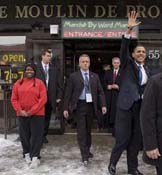 Political realism urges a few brief further glances at just how President Obama’s American people are (or are not) being informed of all this northern exposure. (As Canada’s minority Prime Minister Stephen Harper explained to the CBC’s Peter Mansbridge, on TV, in the end it doesn’t matter what’s right and what’s wrong in fact, whenever there’s any disagreement between Canada and the United States Canada loses — or something like that.) Political realism urges a few brief further glances at just how President Obama’s American people are (or are not) being informed of all this northern exposure. (As Canada’s minority Prime Minister Stephen Harper explained to the CBC’s Peter Mansbridge, on TV, in the end it doesn’t matter what’s right and what’s wrong in fact, whenever there’s any disagreement between Canada and the United States Canada loses — or something like that.)
So ... The New York Times put something of a characteristically semi-satirical tilt on its headline for the main story: "Obama Makes Overtures to Canada’s Leader." Somewhat more in an earlier tradition, the Los Angeles Times carried a definitely un-serious article headlined "Obama, the ex-smoker, encounters much love and one cigarette protest in Canada." It also noted: "Obama says sending more troops to Afghanistan is a possibility."
The San Francisco Chronicle variously reported: "Obama treads lightly in meeting with Canada's PM," "Canada encouraged by Obama talk on trade, oil," and "Obama makes surprise stop at Ottawa market." Finally, we could find nothing about the president’s Canadian visit at all when we searched "Canada" on the website of the Dallas Morning News! (Students of recent Canadian history may note that George W. Bush was once Governor of Texas. Students of the deeper past may remember that, even though he was a Democrat, Lyndon Johnson from Texas was once very abusive to Canadian Prime Minister — and Nobel Prize winner — Lester Pearson.)
Meanwhile, back at the ranch: Salutin, Simpson, and Ontario black historian Robinson ...
 Realism also urges us to recognize that not all Canadian media characters are exactly fans of Barack Obama. Rick Salutin, the Globe and Mail’s representative of the trendy old left in Toronto, is a case in point in "Obama edginess in Ottawa." Realism also urges us to recognize that not all Canadian media characters are exactly fans of Barack Obama. Rick Salutin, the Globe and Mail’s representative of the trendy old left in Toronto, is a case in point in "Obama edginess in Ottawa."
You might think that another Globe and Mail character, Jeffrey Simpson, is equally critical, just from the title of his report on the short but very sweet visit: "Obama's élan, and some trumped up ‘clean energy dialogue'." But Mr. Simpson returns to the more general mood of love with his last sentence: "Coming to Canada first, saying so many well-honed things about Canada, mentioning that his brother-in-law is Canadian, and showing sensitivity to the feelings of the smaller country in the relationship bodes very well indeed."
The Vancouver Sun has run a story with what might seem an unusual title for Vancouver ("Obama's visit stirs memories for Ont. historian") — but a sensible ultimate message, that shows Canadians are not just blindly worshiping President Obama: "Gwen Robinson was watching it all happen with a sense of awe on Thursday from her home in Chatham, Ont. ... For Robinson, a 77-year-old black history specialist in a city that was once the key Canadian terminus for escaping slaves on the Underground Railroad, Obama's brief trip to this country stirred deep feelings about her own roots as a black Canadian and the political progress of her race. ... ‘I just hope we don't expect too much of Obama,’ she said. ‘I think he's a brilliant man. But there's only so much he can do.’"
President Obama makes his point ... for Canada and global village ...
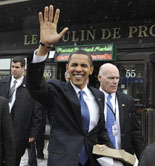 Like the San Francisco Chronicle, the Vancouver Sun has also drawn attention to the president’s unscheduled and eminently crowd-pleasing shopping excursion in Ottawa’s ancient Byward Market ("Crowds thrilled by Obama's wave, unscheduled stop"). Like the San Francisco Chronicle, the Vancouver Sun has also drawn attention to the president’s unscheduled and eminently crowd-pleasing shopping excursion in Ottawa’s ancient Byward Market ("Crowds thrilled by Obama's wave, unscheduled stop").
At the other end of the country, the Halifax Chronicle Herald has published a good summary of the event at large, by Jennifer Ditchburn and Martin Ohanlon of the Canadian Press. (TV watchers may remember that Ms. Ditchburn got to ask the last question at the Obama-Harper news conference yesterday as well.) If you have still somehow missed hearing all the more obvious details, this is a good place to start. It’s headlined "A hand across the border ... As throngs cheer in Ottawa, Obama pledges co-operation on vital issues."
This Ditchburn-Ohanlon piece ends with President Obama’s own characteristically elegant summary of the reason for the whole thing: "I came to Canada on my first trip as president to underscore the closeness and the importance of the relationship between our two nations and to reaffirm the commitment of the United States to work with friends and partners to meet the common challenges of our time." Whatever else, no one could deny that his short but very sweet visit to the northern neighbour he says he loves (and only partly because his sister married a Canadian) has certainly shown "the commitment of the United States to work with friends and partners to meet the common challenges of our time" — in a way that certainly is some kind of exact opposite of former President George W. Bush.
"He came here and took us very seriously" (what a nice surprise) ...
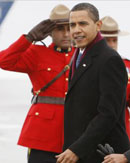 The Halifax Chronicle Herald has also published an interesting Canadian Press article by Alexander Panetta, headlined "Obama impresses behind the scenes." This begins with: "He told Michael Ignatieff he’d read his books. He discussed parenthood with Stephen Harper. And he chatted about Haiti with Gov. Gen. Michaelle Jean ... All three Canadians declared they established an immediate rapport with Barack Obama during the U.S. president’s first foreign visit ... And Canada’s prime minister, opposition leader, and Governor General emerged with rave reviews after meeting the rookie president." The Halifax Chronicle Herald has also published an interesting Canadian Press article by Alexander Panetta, headlined "Obama impresses behind the scenes." This begins with: "He told Michael Ignatieff he’d read his books. He discussed parenthood with Stephen Harper. And he chatted about Haiti with Gov. Gen. Michaelle Jean ... All three Canadians declared they established an immediate rapport with Barack Obama during the U.S. president’s first foreign visit ... And Canada’s prime minister, opposition leader, and Governor General emerged with rave reviews after meeting the rookie president."
The Governor General’s big story — about how the President "cracked that he might have to move here if things go badly down south" — has already been told above. Meanwhile, Conservative officials were very pleased that Prime Minister Harper’s one-on-one conversation with President Obama lasted much longer than planned: And: "‘It was a great conversation,’ Harper told the CBC ... ‘He’s an easy guy to like and an easy guy to get to know.’"
At the very end of things, at the Ottawa airport, Liberal Leader of the Official Opposition Michael Ignatieff met with the president as well. This meeting "also lasted double the allotted time, with Ignatieff and the president sitting together for a half-hour in an airport lounge instead of the scheduled 15 minutes ... ‘His replies are very substantial. They’re very thoughtful,’ Ignatieff said ... ‘It’s a form of respect not to me personally. It’s a form of respect to our country. He came here and took us very seriously.’"
"Canada-États-Unis — Un nouveau départ"
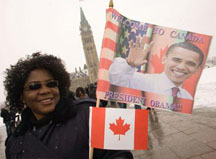 Very few people take Canada this seriously, of course — including more than a few people in Canada. To us, this just confirms our support for the theory noted below "that, at some point, the Barack Obama presidency is going to finally compel the emerging Canadian people of the 21st century to at least briefly face up to their real longer term future, as an independent free and democratic society in the most northerly wilderness regions of North America." Very few people take Canada this seriously, of course — including more than a few people in Canada. To us, this just confirms our support for the theory noted below "that, at some point, the Barack Obama presidency is going to finally compel the emerging Canadian people of the 21st century to at least briefly face up to their real longer term future, as an independent free and democratic society in the most northerly wilderness regions of North America."
We similarly still do not think that President Obama is going to have any seminal influence on the shorter term rivalry between Stephen Harper and Michael Ignatieff, in the quiet jungle of Ottawa practical politics. More generally, Gwen Robinson is certainly right when she urges "I just hope we don't expect too much of Obama ... I think he's a brilliant man. But there's only so much he can do." And we suspect that Jeffrey Simpson is right, for the shorter term again, about the "trumped up ‘clean energy dialogue'" that has apparently now begun between the United States and Canada, as a result of President Obama’s visit.
But like many other Canadians, no doubt, we are looking forward to the president’s promised next visit, when the weather gets warmer. And as February lurches towards its characteristically harsh conclusion with some fresh snow to shovel, in our particular part of the country, we are looking forward to the weather getting warmer too. Meanwhile, three cheers for President Barack Obama and "Canada-États-Unis — Un nouveau départ." It’s about time ... even if it has taken some near-great crash in the world economy to bring it off.
Earlier report, February 17: GREAT DAY FOR CANADA .. President Obama’s February 19 visit makes us stop and think .. a bit
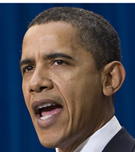 Of course it is the big Canadian event of the week. But the US papers just say: "After returning ... from a long weekend in Chicago, Obama sets out for Denver, Phoenix and Canada — his first trip outside the country since being sworn in — later this week." Or: "Obama won't be in Washington long; he heads to Colorado, Arizona and Canada this week ..." Of course it is the big Canadian event of the week. But the US papers just say: "After returning ... from a long weekend in Chicago, Obama sets out for Denver, Phoenix and Canada — his first trip outside the country since being sworn in — later this week." Or: "Obama won't be in Washington long; he heads to Colorado, Arizona and Canada this week ..."
It is almost as if going to Canada is not really a "trip outside the country." The journey from Washington, DC to the Canadian capital in Ottawa is shorter than the journey from Washington to Fort Myers, Florida, where the president spoke last week. And in Canada right now President Obama is more popular not just than Canadian minority Prime Minister Stephen Harper — but than every other leader of a Canadian federal political party too (including Michael Ignatieff).
For some President Obama's popularity raises old thoughts about the USA’s "annexing Canada and parts of Latin America." Yet no matter what he does about health care reform, for the great middle-class majority the US system will remain worse than the one we already have up here. Then there are our banks, the French fact, and the northern wilderness. Then there are all the other imponderables that make Canada the agreeable place it is for those who live here. And Barack Obama’s visit in the winter of everyone’s discontent urges us to stop and ponder these things, for a little while at least.
What about the tar sands in Alberta?
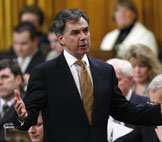 Before and after the president’s short trip, the dean of Ottawa pundits, Jeffrey Simpson, has written, "to say nothing of when he will be here, the Canadian media will be parsing: What does his visit mean for Canada?" Before and after the president’s short trip, the dean of Ottawa pundits, Jeffrey Simpson, has written, "to say nothing of when he will be here, the Canadian media will be parsing: What does his visit mean for Canada?"
Some Canadian (and even American?) politicians and business people see it as an opportunity to discuss certain Canada-US bilateral issues. To take just one leading case in point, Mr. Harper’s new "Federal Environment Minister Jim Prentice says his government and that of US President Barack Obama share common principles on fighting climate change that will go a long way toward working out a North American environmental accord."
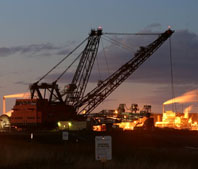 The very bottom line here is that "Canada's oil sands [aka tar sands] are often criticized in the US for producing three to four times as much greenhouse gases as conventional oil. Some state governments have already introduced legislation that could ban oil sands-derived oil." Mr. Harper and Mr. Prentice, both from Alberta, would like to see a North American environmental accord that keeps the US market vigorously open to oil sands-derived oil from Canada. The very bottom line here is that "Canada's oil sands [aka tar sands] are often criticized in the US for producing three to four times as much greenhouse gases as conventional oil. Some state governments have already introduced legislation that could ban oil sands-derived oil." Mr. Harper and Mr. Prentice, both from Alberta, would like to see a North American environmental accord that keeps the US market vigorously open to oil sands-derived oil from Canada.
On the other hand, according to an article in the New York Times last week: "George Bush and Dick Cheney saw the resource as a pillar of economic activity and energy security for the United States. But the tar sands have delivered neither security nor sustainability. How [President Obama] deals with the rapid development of the tar sands will pretty much indicate how serious he is about a switch to alternative and renewable energies." (Oh, and btw, George W. Bush will be making his first trip outside the country since he left the White House, to give a speech in Calgary, this coming March 17.)
Other bilateral issues ... from one side or the other ...
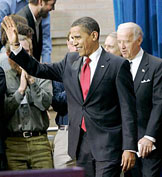 Another bilateral Canada-US issue which has much exercised the Canadian media lately — the exact meaning of the "Buy America" provisions in the US economic stimulus bill that President Obama signed into law in Denver today — has already been vented on the venerable 60 Minutes TV news show stateside, this past weekend. Another bilateral Canada-US issue which has much exercised the Canadian media lately — the exact meaning of the "Buy America" provisions in the US economic stimulus bill that President Obama signed into law in Denver today — has already been vented on the venerable 60 Minutes TV news show stateside, this past weekend.
(The apparent resolution, for the moment, is that the Buy America provisions for stimulus-package expenditures will have to be implemented with particular reference to US trade agreements — like the North American Free Trade Agreement [NAFTA]. Some critics complain this still allows US state governments to discriminate against Canadian suppliers in government purchases involving stimulus-package funds. This may be something that either or both Mr. Harper and/or Mr. Ignatieff will be raising with Mr. Obama on February 19.)
 Canada`s current and future role in the NATO mission in Afghanistan is another issue the Canadian media has wondered about in connection with President Obama`s visit. Canada`s current and future role in the NATO mission in Afghanistan is another issue the Canadian media has wondered about in connection with President Obama`s visit.
According to a Canadian Press report early this afternoon: "US President Barack Obama is expressing his gratitude for Canada's contribution to the war in Afghanistan — and sending strong signals his approach to the problem will be rooted in diplomacy and development, rather than force ... In an interview with the CBC, Mr. Obama said he's convinced the problems of Afghanistan, including the spread of extremism, cannot be solved by ‘military means alone’ ... The US President said he wants to discuss a ‘comprehensive strategy’ for the Afghan conflict when he arrives Thursday in Ottawa to meet with Prime Minister Stephen Harper ... He said the situation in Afghanistan is ‘deteriorating’ and that any strategy would need political support in both Canada and the US."
Delays in the movement of trade goods across the Canada-US border — as a result of both heightened security and other concerns — is another issue frequently raised in the Canadian media. This past Valentine’s Day a New York Times article on the Obama stimulus package noted its parallel connections with plans to "build bridges to Canada from Detroit."
 To quote from the Times’ article at greater length: "Bridge to Canada: $1.8 billion (US share) ... It is one of the nation’s busiest border crossings, but Detroit is linked to Canada only by a tunnel and an 80-year-old privately owned bridge. The United States and Canada are working together to build what they are calling the Detroit River International Crossing, a new six-lane bridge, and last month they got the final environmental clearance from the federal government. (They still need some local government approvals to acquire some land.) But the owner of the current bridge, the Ambassador Bridge, is moving ahead with a plan to build a new, privately owned bridge to replace the one he owns. With border crossings down these days, it is unclear if the Detroit River needs two new bridges, though state officials say it does. And officials say the severely depressed local economy could use the 10,000 jobs they say the public bridge project would generate on the Michigan side of the border." To quote from the Times’ article at greater length: "Bridge to Canada: $1.8 billion (US share) ... It is one of the nation’s busiest border crossings, but Detroit is linked to Canada only by a tunnel and an 80-year-old privately owned bridge. The United States and Canada are working together to build what they are calling the Detroit River International Crossing, a new six-lane bridge, and last month they got the final environmental clearance from the federal government. (They still need some local government approvals to acquire some land.) But the owner of the current bridge, the Ambassador Bridge, is moving ahead with a plan to build a new, privately owned bridge to replace the one he owns. With border crossings down these days, it is unclear if the Detroit River needs two new bridges, though state officials say it does. And officials say the severely depressed local economy could use the 10,000 jobs they say the public bridge project would generate on the Michigan side of the border."
Finally, an article in the Los Angeles Times yesterday raised (with some sense of humour) a Canada-US intellectual property issue that is rarely (if ever?) discussed in the Canadian media: "The International Intellectual Property Assn., a lobbying group for US copyright owners, released its recommendations today to the US trade representative, and once again it's calling on the government to crack down on that notorious piracy hotbed ... Canada. Specifically, it's asking the Obama administration to add Canada to the "Priority Watch List" alongside Mexico (hey, it's a NAFTA reunion!), Russia, China and other countries with a reputation for disregarding copyrights, patents and trademarks."
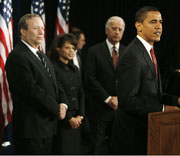 The article went on: "The group's complaints about our neighbors to the north fill nearly nine pages, but the executive summary boils them down to these: ‘ineffective border controls, insufficient enforcement resources, inadequate enforcement policies, and a seeming unwillingness to impose deterrent penalties on pirates.’ In particular, the IIPA wants Canada to do more to block the manufacture and sale of video game ‘mod’ chips and other equipment to circumvent electronic locks; raise the statutory penalties for unauthorized copying, even when it's done for personal use; crack down on the manufacture and sale of bootlegged DVDs; and require ISPs to take down infringing material upon request, rather than simply passing a notice of infringement on to the customer responsible for it ... The Bush administration resisted the group's previous requests to put Canada in the shunned group. The designation seems more symbolic than anything else; according to the US trade representative, countries on the list are ‘subject to accelerated investigations and possible sanction.’ Wow, chilling. But if Hollywood is so concerned about Canada, why does it shoot so many movies and TV shows there? If it really wanted to change the Canadian government's behavior, perhaps it should stop using Toronto's streets in place of New York's ..." The article went on: "The group's complaints about our neighbors to the north fill nearly nine pages, but the executive summary boils them down to these: ‘ineffective border controls, insufficient enforcement resources, inadequate enforcement policies, and a seeming unwillingness to impose deterrent penalties on pirates.’ In particular, the IIPA wants Canada to do more to block the manufacture and sale of video game ‘mod’ chips and other equipment to circumvent electronic locks; raise the statutory penalties for unauthorized copying, even when it's done for personal use; crack down on the manufacture and sale of bootlegged DVDs; and require ISPs to take down infringing material upon request, rather than simply passing a notice of infringement on to the customer responsible for it ... The Bush administration resisted the group's previous requests to put Canada in the shunned group. The designation seems more symbolic than anything else; according to the US trade representative, countries on the list are ‘subject to accelerated investigations and possible sanction.’ Wow, chilling. But if Hollywood is so concerned about Canada, why does it shoot so many movies and TV shows there? If it really wanted to change the Canadian government's behavior, perhaps it should stop using Toronto's streets in place of New York's ..."
Practical politics of the Obama visit in Canada today ...
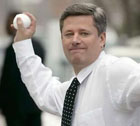 Don Martin, who may be closer to the Harper government than most other Ottawa pundits, urged this morning that: "There's quite the titter out there speculating which Canadian political leader will forge the best connection to Barack Obama during the presidential flypast of Ottawa this week" — Conservative Prime Minister Stephen Harper, or Liberal Leader of the Official Opposition Michael Ignatieff? Don Martin, who may be closer to the Harper government than most other Ottawa pundits, urged this morning that: "There's quite the titter out there speculating which Canadian political leader will forge the best connection to Barack Obama during the presidential flypast of Ottawa this week" — Conservative Prime Minister Stephen Harper, or Liberal Leader of the Official Opposition Michael Ignatieff?
Brian Laghi has opined in Canada’s self-appointed national newspaper: "There are a number of reasons why a political leader would want to get close to Mr. Obama. He's new, espouses nonpartisanship and symbolizes hope. But it's also clear that Mr. Harper and Mr. Obama have different views on how to govern and, at this point, Mr. Obama's seems to better reflect the state of public opinion ... The leaders' contrasting approaches to political partisanship will no doubt draw comment." (Or as explained recently by the Huffington Post's Giles Snade: "These days, Harper sustains a rickety minority government by adopting liberal policies that are completely foreign to his political nature ... An awkward man at the best of times, these painful efforts are like witnessing the public performance of a country musician trying to learn reggae.")
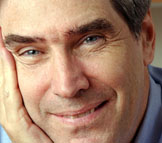 You could take all this to mean than Mr. Ignatieff is most likely to forge the best connection to Mr. Obama. Last Thursday Jane Taber reported in Canada’s self-appointed national newspaper that there "is a buzz around the new Liberal Leader, who several weeks ago was the subject of a huge spread in the Sunday New York Times and is awaiting the arrival of a PBS television crew that is coming to Ottawa to do a documentary on him ... And in contrast to Mr. Harper, the new Liberal Leader, who is well-travelled and well-known in Britain and the United States, even has an advantage when it comes to Mr. Obama, who is visiting Ottawa next week ... The two politicians, who will meet for the first time next Thursday, have several close friends in common: Lawrence Summers, head of the White House's National Economic Council, is the former president of Harvard. He and his wife and Mr. Ignatieff and his wife, Zsuzsanna Zsohar, travel together, having spent part of a summer in the south of France." You could take all this to mean than Mr. Ignatieff is most likely to forge the best connection to Mr. Obama. Last Thursday Jane Taber reported in Canada’s self-appointed national newspaper that there "is a buzz around the new Liberal Leader, who several weeks ago was the subject of a huge spread in the Sunday New York Times and is awaiting the arrival of a PBS television crew that is coming to Ottawa to do a documentary on him ... And in contrast to Mr. Harper, the new Liberal Leader, who is well-travelled and well-known in Britain and the United States, even has an advantage when it comes to Mr. Obama, who is visiting Ottawa next week ... The two politicians, who will meet for the first time next Thursday, have several close friends in common: Lawrence Summers, head of the White House's National Economic Council, is the former president of Harvard. He and his wife and Mr. Ignatieff and his wife, Zsuzsanna Zsohar, travel together, having spent part of a summer in the south of France."
At the same time, in order to reduce the prospects of Official Opposition Leader Ignatieff’s (apparently quite brief) meeting with President Obama, the Conservative minority government is said to have scheduled it for some garage at the Ottawa airport at the very end of the president’s visit. (And Ignatieff's friend Lawrence Summers will apparently be with the Obama official party; Liberal foreign affairs critic Bob Rae will be accompanying Ignatieff.) Similarly, some argue that Michael Ignatieff is actually Canada’s new Barack Obama, but this seems to us highly improbable at the very least. (Just for starters, what historic minority does Mr. Ignatieff represent — unless you are going to count the grandchildren of former Tsarist civil servants in North America?) Our guess is that, at the very end of things, President Obama’s "flypast of Ottawa this week" will have very little practical impact on Canadian politics. And we are hoping that whatever slight impact it may have will turn out to be some kind of surprise.
Obamania and Canada’s longer term future ...
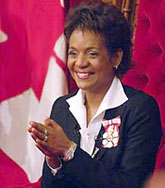 We do continue to support the theory that, at some point, the Barack Obama presidency is going to finally compel the emerging Canadian people of the 21st century to at least briefly face up to their real longer term future, as an independent free and democratic society in the most northerly wilderness regions of North America. We do continue to support the theory that, at some point, the Barack Obama presidency is going to finally compel the emerging Canadian people of the 21st century to at least briefly face up to their real longer term future, as an independent free and democratic society in the most northerly wilderness regions of North America.
This of course won’t happen on President Obama’s brief first official visit. But this coming Thursday, February 19, 2009 we will be looking carefully for signs of what may ultimately lie ahead in this direction. Mr. Obama, we think (or certainly hope at any rate, and even with some optimism after his first few weeks in office), is almost inevitably going to change the United States in some constructive ways, almost regardless of the exact details of his time in office. Change of this sort in the United States is bound to affect Canada too. Remember: the present Canadian confederation began in the wake of the American Civil War.
There are those on both sides of the unfortified (if no longer exactly undefended?) border who will say that the United States has always been more of a "peoples’ country" than the Canadian con federation of 1867 — with its all too lingering ties to various old European monarchies and all that. But these ties grow weaker every day now, and the Canadian Charter of Rights and Freedoms in the new Constitution Act 1982 has already set what it calls the "free and democratic society" of the present on some new foundations. Even what we still do call the throne speeches of Mr. Harper’s Conservative government allude much more often to "the Canadian people" than they do to the British monarch across the seas. (Whose practical role has nowadays been virtually altogether usurped by Governor General Michaelle Jean, who will apparently be at least briefly greeting President Obama, when he first steps off his legendary airplane.)
Canada being what it is nowadays also inevitably exerts less pressure on its people to be Canadian in any particular way than the United States exerts on its people to be proud Americans. (Even or especially under President Obama?) Some continue to see this as a weakness, and perhaps in some ways it still is. But it also seems to us that in other ways it qualifies Canada as an especially vigorous new peoples’ country of the 21st century.
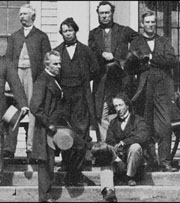 Whatever else may be worthwhile about carrying on with the Canadian experiment as we find it today, one of the country`s highest virtues is that, to a quite remarkable degree, individual Canadian citizens remain free to define their citizenship more or less as they choose. A story that our office manager here at the counterweights world headquarters tells about her Niagara Falls hydro-worker grandfather seems to us to illustrate the essential point. Every year on his birthday he would declare that it was "A Great Day for Canada." Whatever else may be worthwhile about carrying on with the Canadian experiment as we find it today, one of the country`s highest virtues is that, to a quite remarkable degree, individual Canadian citizens remain free to define their citizenship more or less as they choose. A story that our office manager here at the counterweights world headquarters tells about her Niagara Falls hydro-worker grandfather seems to us to illustrate the essential point. Every year on his birthday he would declare that it was "A Great Day for Canada."
Canada, we think, is worth carrying on with, whatever may happen over the next number of years in these very challenging times for the entire global village, no doubt, because it is still somehow reasonable for all its citizens, no matter what their origins, cultures, official languages, etc, etc, to declare their birthdays great days for Canada. As it happens, we have just learned, February 19, 2009, is the birthday of our hard-working office manager, as well as the day of President Obama`s first official visit to Ottawa ("the last lumber village before the North Pole," as some used to say in the 19th century). And on both grounds it qualifies as "A Great Day for Canada" too. Here`s hoping we Canadians — who are now as numerous as Americans were, at the outbreak of the American Civil War — will somehow make the most of it. Only registered users can write comments.
Please login or register. Powered by AkoComment 1.0 beta 2!
|
